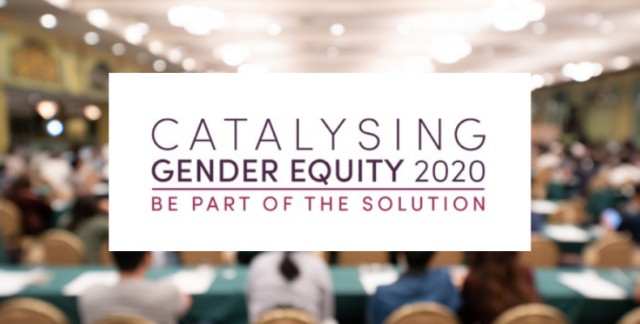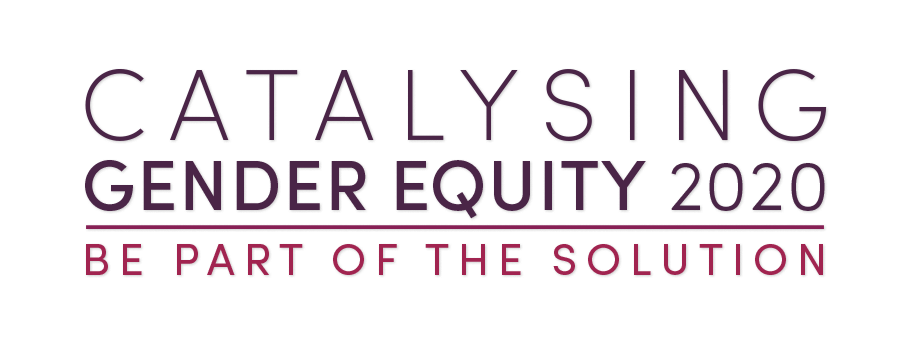
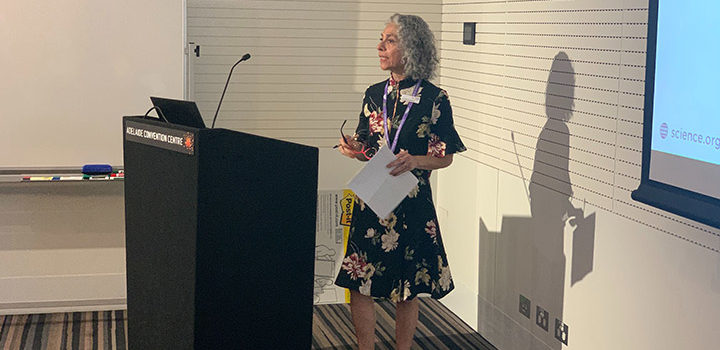 SAGE Executive Director, Dr Wafa El-Adhami, speaking at the Exploring Departmental Awards workshop.
SAGE Executive Director, Dr Wafa El-Adhami, speaking at the Exploring Departmental Awards workshop.
Exploring Departmental Awards for SAGE
The SAGE community has been highly engaged in the Athena Swan Bronze Award accreditation program, with 39 institutions receiving accreditation so far.
This workshop consolidated key suggestions to shape the SAGE awards pathway post-Bronze.
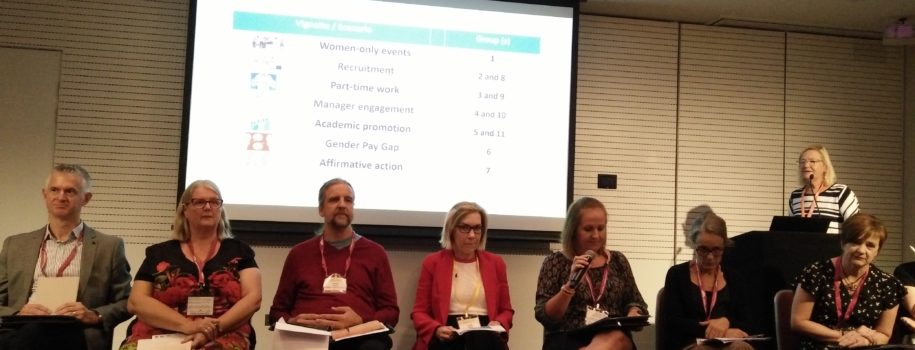 Members of the SAGE WA Regional Network present at the ‘Shifting the spectrum of male engagement with gender equity' workshop.
Members of the SAGE WA Regional Network present at the ‘Shifting the spectrum of male engagement with gender equity' workshop.
Shifting the spectrum of male engagement with gender equity
The SAGE Western Australian Regional Network developed this workshop to help engage the minority of people who oppose or are disinterested in gender equity initiatives.
Participants discussed specific scenarios that came from the direct experience of the regional network members, such as responses to affirmative recruitment action and women-only events.
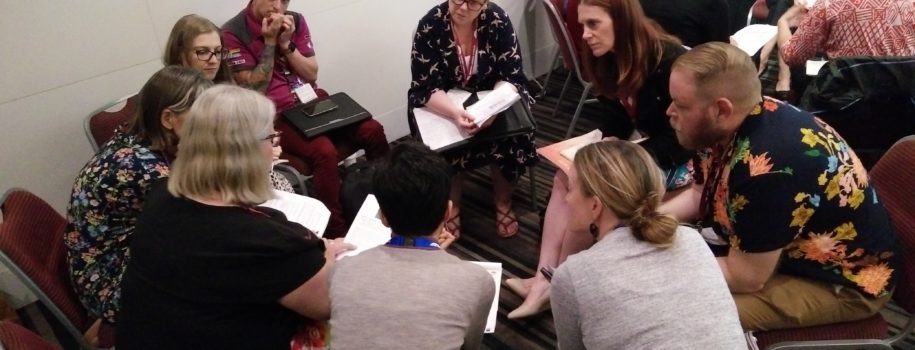 Group discussions at the SAGE WA Regional Network workshop.
Group discussions at the SAGE WA Regional Network workshop.
The session provided eye-opening perspectives that will feed into a resource to assist people responding to similar situations. As one participant commented, “The gender equity journey is not just a women’s journey—everybody needs to be onboard.”
Fascinating (and packed!) workshop session on male engagement with gender equity. A lot of interesting feedback and stories based around a range of scenarios. #CGE2020 pic.twitter.com/ZzW95fIHXv
— SAGE at Sydney (@SAGEatSydney) February 21, 2020
Based on the presentations and group discussions, the WA Regional Network have developed If This, Then That, a set of rehearsal narratives to guide staff in responding to challenging situations about gender equity. The Network is happy to take further submissions for the resource, such as suggestions for other scenarios.
Achieving gender equity targets through systemic change
The SAGE New South Wales Regional Network’s workshop focused on the implementation of equity strategies. Through an experience-driven, collaborative discussion, participants identified key strategies for implementing gender equity targets in STEMM, with an emphasis on the relationship between central goals and local actions.
This workshop built upon findings from the Strategies for Success Symposium held at UTS in July 2019. Collaborators from the NSW Regional Network (including Western Sydney University and Macquarie University) also shared their practical experiences, which include increasing female applicants in STEMM by using gender-neutral language in recruitment. They also discussed challenges such as setting targets for intersectionality, key performance indicators for diversity, and the complexity involved in taking an university-wide approach across different sectors.
Discussion groups focused on connecting the global and local; discussing the merit principle; recruitment changes, retention, promotion and succession planning; monitoring and evaluation; and building capacity for cultural change.
Workshop attendees identified opportunities for future collaboration across networks and between higher education institutions and industry. Attendees also identified the need for more self-reporting and data-sharing.
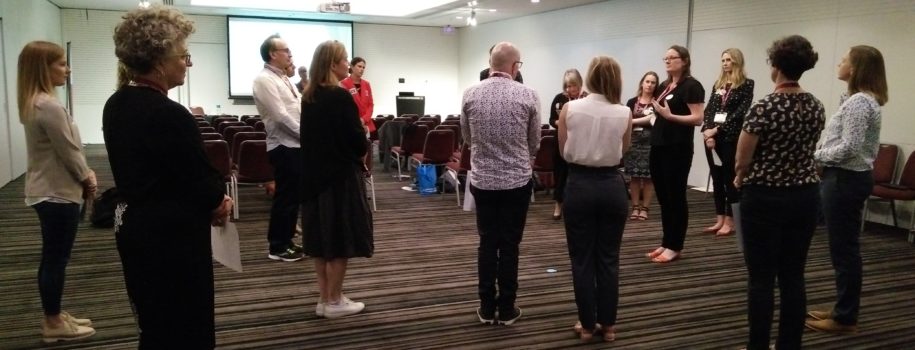 Attendees taking part in an Intersectionality Walk at the SAGE ACT Regional Network workshop.
Attendees taking part in an Intersectionality Walk at the SAGE ACT Regional Network workshop.
Walking in the shoes of others
In this SAGE ACT Regional Network workshop, participants actively contributed to understanding and educating others on the importance of intersectionality for innovative organisations.
Attendees took part in an Intersectionality Walk, where they walked in the shoes of others by adopting different personas in fictitious scenarios. One attendee commented on the power of the “whole-body experience of the role play”, while another said that the activity provided “a visual shock of what exclusion or leaving people behind looks like”.
Walking in the shoes of others during a workshop on intersectionality at #CGE2020 Everyone may appear to start in the same space but that can rapidly change pic.twitter.com/pJK2XmqZnC
— Merryn McKinnon (@MezMcK) February 20, 2020
Intersectionality Walks in action, before and after system-change, and through listening. Great fun at this Intersectionality Workshop today at Catalysing Gender Equity 2020. #CGE2020 pic.twitter.com/gloHAdy58O
— Dr Colleen MacMillan (@ColleenMac3) February 20, 2020
This was followed by a plenary discussion which provided cross-institutional opportunities for collaborative research recommendations. Participants discussed the need for data-driven actions, compounded by the challenge of gathering diversity data in a secure manner.
The challenge of tackling intersectionality targets in STEMM – and the challenge of not having the available data. A workshop participants poses the simple question “What does your classroom look like?” #CGE2020 @Science_Academy pic.twitter.com/yIGU2Q0AwA
— Justine Shaw (@justine_d_shaw) February 21, 2020
As a result of the workshop, 29 organisations signed on to be involved in the research led by Professor Thomas and Dr MacMillan. All participants requested Intersectionality Walk resources for implementation in their own organisations. Their work has been published in the paper ‘Seeing and overcoming the complexities of intersectionality’.

